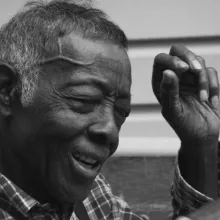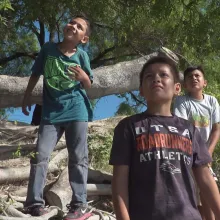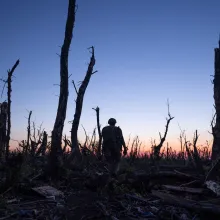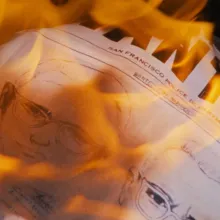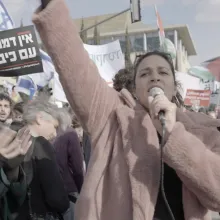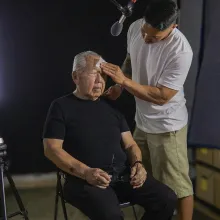Sundance is a unique crossroads of industry and independence, where you are able to be surprised by films that you didn’t see coming—films that often end up disrupting the film industry’s ideas of marketability, contending for awards and being placed on all sorts of year-end lists, if they’re able to find the right support. As Sundance Film Festival looks to a future away from Park City, looking into questions of location, land, capital, culture, and evolution, I find myself attracted to the films in the 2025 lineup that seek context and answers to these same questions: Move Ya Body: The Birth of House, BLKNWS: Terms & Conditions, Seeds, Free Leonard Peltier, and Khartoum.
Sundance
Following the death of one of her brothers, filmmaker Robie Flores returns to her hometown, Eagle Pass, on the Texas/Mexico border, wanting to turn back time. She collides with unruly experiences of adolescence that invite her to soak up the details of the home her late brother adored, and she ignored. 'The In Between' premiered February 10, 2025, on 'Independent Lens.'
The lineup of the 2025 Sundance World Documentary section was more expansive in its geopolitical interest than last year’s. This year the dissenting subtext assumed functional pointedness, with each work making a broader statement against hostile governments. The theaters went packed and audiences cheered as the snow-clad Park City lent an otherworldly, almost mythical safe space to the independent makers and their works. Although there is speculation of the festival moving out of state in 2027, it is difficult to imagine a setting more suited to Sundance than Utah. The inconveniences, like the high altitude and the extreme dry weather, somehow added to the charm and made me feel, albeit perversely, like I had earned the right to be an attendee.
It’s not called the Sundance “International” Film Festival, but it has become increasingly so, becoming one of the most vital global launchpads for nonfiction work. Despite the fact that there have yet to be any flashy global streamer deals (or even smaller sales) announced for any of this year’s documentaries, the industry’s wheels are churning. Highly praised films, such as Geeta Gandbhir’s riveting Directing Award winner The Perfect Neighbor and David Osit’s complex media exposé Predators are likely to find buyers soon, while at least one of the festival’s World titles was scooped up for international sales.
I interviewed Reid Davenport for the Doc Star of the Month column in 2022, the year the Stanford-trained TED fellow nabbed the Directing Award for U.S
Prolific documentary essayist Charlie Shackleton’s latest film focuses on one of America’s most notorious criminals, the Zodiac Killer. Or rather, it’s a film about the documentary he would’ve made about the serial killer, had he been able to secure the rights to California Highway Patrol Officer Lyndon E. Lafferty’s 2012 true-crime book, The Zodiac Killer Cover-Up. As he describes the project that didn’t materialize, Shackleton pokes fun at the tropes that have come to define modern true crime shows. For Documentary, Shackleton spoke about weighing art against artifice and the ethical considerations of true crime.
Noam Shuster Eliassi’s standup comedy show “Coexistence, My Ass!” is now the basis for a documentary of the same name, Coexistence, My Ass!, in which Lebanese Canadian filmmaker Amber Fares follows her through the COVID-19 pandemic, the anti-corruption protests in Israel, and the aftermath of the October 7th attack and Israel’s brutal retaliation in Gaza. Ahead of the film’s premiere at Sundance, we sat down with Fares over Zoom to discuss its long filming process and how October 7 shifted the tenor of the project.
For 15 years, Amy Berg wanted to make a film on Jeff Buckley. The joy of watching It's Never Over, Jeff Buckley then resides in witnessing Berg’s commitment to telling a known story and using rare archives, of the singer’s aching voice in elaborate voice messages he sent his loved ones. The film premiered at the Sundance Film Festival and after, Berg spoke to me about the making of the documentary and whether her love for the artist altered in the process.
Isabel Castro’s sophomore feature centers the family band that catapulted Mexican American singer Selena into pop stardom. Given voice as never before through “hundreds, potentially thousands” of hours of archival footage, Selena Quintanilla constantly gushes about her band—sister Suzette on drums, brother A.B. on bass/producing duties, eventual husband Chris on guitar, and parents Marcella and Abraham as just about everything in between—as the key to her fame. I spoke with Castro a week before her film’s Park City debut, which was yesterday. We discuss the herculean process of combing through the Quintanillas’ archives, paying homage to Gregory Nava’s 1997 biopic and the filmmaker’s favorite Selena song.
In Third Act Tadashi Nakamura trains his lens on his father, Robert Nakamura, who is regarded as the “godfather of Asian American media.” Robert has played a key role as one of the first Japanese American filmmakers to represent the Japanese American experience through his films and images. Now in the third act of his life, he has decided to share his own. The documentary recently premiered at Sundance as part of the U.S. Documentary Competition. I spoke with Tadashi to understand how he went about shooting the film and if the process of filming Robert Nakamura was a veiled act of delaying grieving for his father.





